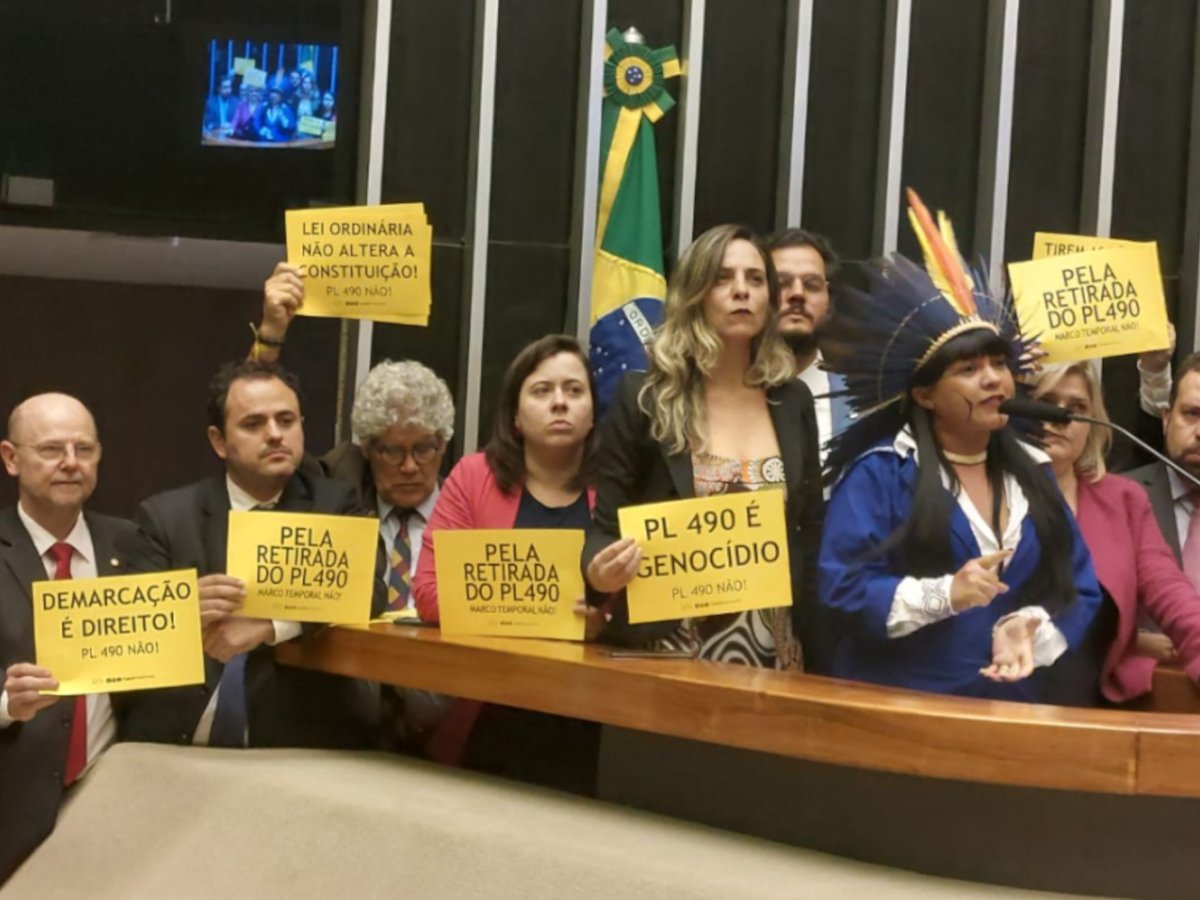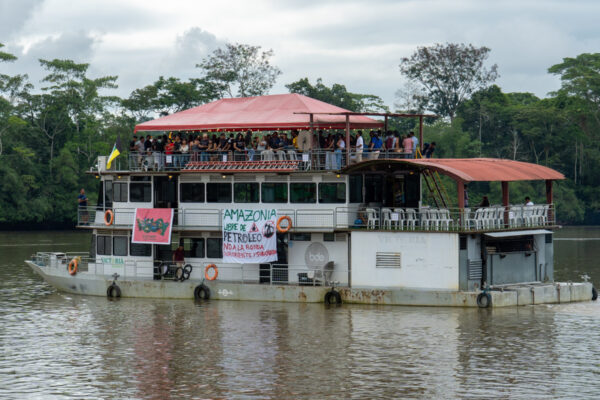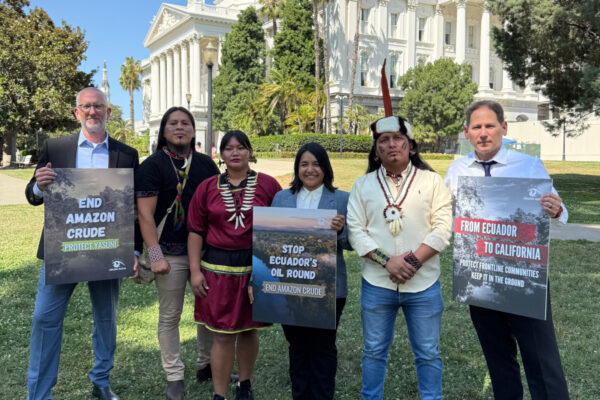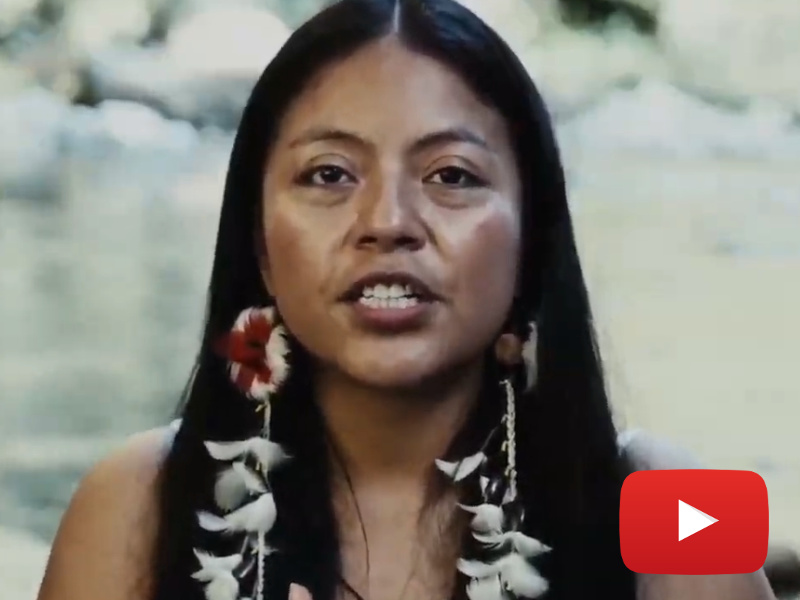Yesterday, May 24, 2023, a Brazilian congressional committee overwhelmingly approved by 15 votes to 3, draft legislation, known as Provisional Measure 1154, by Deputy Isnaldo Bulhões Jr. to slash the authority of the Ministries of Indigenous Peoples and the Environment. The move shifts the socio-environmental administrative structure of Brazilian President Lula’s administration by stripping the authority of the Ministry of Indigenous Peoples (MPI) to demarcate, or legally recognize, Indigenous territories. The vote returns this responsibility to the Ministry of Justice – while revoking the Ministry of Environment’s (MMA) control of water resources and Brazil’s rural environmental registry, a key tool in the fight against illegal deforestation and land-grabbing. In doing so, Brazilian lawmakers have reverted the MMA to its Bolsonaro-era structure.
On Thursday, May 25, 2023, in the afternoon, representatives of civil society organizations – including Amazon Watch – sent a manifesto to Brazil’s National Congress leaders. The manifesto, signed by 790 entities, opposes the ministry substitutions outlined in MP 1154.
In a continued assault on Indigenous rights, last night the president of Brazil’s Lower House, Arthur Lira, announced his intention to allow a vote on Bill (PL) 490/2007 next Tuesday, following a plenary vote that broadly approved this legislation to advance as a matter of urgency. The expedited nature of this legislation could foreshadow the likely result of next week’s vote, which could set a legal precedent known as “Marco Temporal” or “Time Limit,” spearheaded by Brazil’s agribusiness lobby to severely limit the right of Indigenous peoples to their ancestral territories. If approved, the legislation would preempt a ruling by Brazil’s Supreme Court on the “Time Limit” thesis, slated for June 7, 2023.
Sonia Guajajara, Head of Brazil’s Ministry for Indigenous Peoples, said: “President Lula brought the Indigenous agenda to the forefront of his election campaign, committing to reviving the process of demarcating indigenous lands. It was with this intent that the Ministry of Indigenous Peoples was created. But now, we witness this Congress launching a full-scale attack on this Ministry, in a country that took 523 years to acknowledge the importance of Indigenous peoples and less than five months to attempt to silence and control us again. The entire world had high expectations that Brazil could reclaim its leading role in combating the climate crisis. The international community expects the Brazilian government to implement effective policies to eliminate deforestation and protect the environment. If we continue attacking the main ally in the fight against deforestation, we risk losing all the international credibility we have been working so hard to rebuild.”
House Speaker Arthur Lira unilaterally decided to expedite the voting on the bill in collaboration with agribusiness and right-wing lawmakers, bypassing the leadership council where such decisions are typically discussed. Lira previously expressed his intention to move the proposal forward to prevent the Supreme Court from making a decision before the Lower House, even though the bill still requires Senate approval.
Ana Carolina Alfinito, Amazon Watch Legal Advisor, said: “The Bill 490 that Congress is violently trying to push through is an outright violation of the Federal Constitution and of international treaties that have been ratified by Brazil, all of which clearly recognize the rights of Indigenous peoples to their traditional lands. Congress does not have the power to approve an unconstitutional ‘Time Limit Trick’ that will hinder the demarcation of any Indigenous lands in the future, jeopardize those that have been recognized, and have long-term detrimental impacts on climate change mitigation. We are witnessing yet another assault on Indigenous rights and the rule of law.”
As yesterday’s events unfolded, the Lula government’s notable absence of resistance to a congressional restructuring of its ministry roles captured widespread attention. The conspicuous lack of response exposed the government’s lack of authority and its limited control over the organization of its own ministries.
While Ministers Marina Silva (MMA) and Sonia Guajajara (MPI) both denounced the moves amid anger and alarm that members of Lula’s administration had done little to oppose the changes, Alexandre Padilha, the Minister of Institutional Relations, garnered attention by commending the efforts by Deputy Isnaldo Bulhões Jr. on Tuesday. Meanwhile, the Workers Party Senate caucus celebrated a resounding victory in congressional committee approval, eagerly sharing their joy on social media.
Ana Paula Vargas, Amazon Watch Brazil Program Director, said: “Brazil’s presidency may have changed, but a deeply-rooted anti-environmental and anti-Indigenous sentiment persists in Congress. Yesterday’s events revealed this rift within the government, extending into the Executive branch and the Worker’s Party. Lula’s success in reducing deforestation and facilitating Brazil’s fight against climate change hinges on his support for Ministers Sonia Guajajara and Marina Silva, and on strengthening Indigenous and environmental agencies. Brazil risks quickly shifting from a hopeful government to one continuing destructive policies, a path the Amazon rainforest and other biomes can’t withstand for another four years.”
More information
Currently, under consideration, Bill 490/2007 presents a major threat to the rights and well-being of Indigenous populations in Brazil. This proposed legislation seeks to significantly curtail the demarcation of Indigenous lands, drawing on the controversial Marco Temporal thesis.
This doctrine, engineered by Brazil’s agribusiness lobby, effectively minimizes Indigenous Peoples’ territorial rights by asserting that they can only lay claim to lands they occupied as of October 1988, the time of the promulgation of the Brazilian Constitution. Not only does this doctrine, seen as blatantly unconstitutional by many, threaten the future demarcation of Indigenous territories, but it also jeopardizes currently recognized territories.
Moreover, Bill 490/2007 opens up Indigenous territories to potentially damaging activities, including mining within Indigenous Lands. Mining operations carry several adverse implications for native peoples, encompassing the spread of diseases, mercury contamination, escalation of conflicts and violence, and sexual exploitation and abuse. The Yanomami Indigenous Territory, the country’s largest, is currently enduring a humanitarian crisis largely due to illegal mining invasions. Over the last four years, invasions have been linked to the deaths of at least 570 children from malnutrition and respiratory diseases, among other problems, as reported by the Sumaúma agency. Recognizing the severity of this crisis, the Lula government has declared a Public Health Emergency of National Importance in the area since January. In addition to these alarming developments, the bill poses a grave danger to Indigenous populations living in voluntary isolation. It threatens potential contact, including by third parties such as religious missionaries when deemed a matter of “public interest.”
The report from Representative Isnaldo Bulhões Jr. presented on Tuesday, May 23, 2023, in the Lower House concerning Provisional Measure 1.154 is a step backward.
The new draft removes significant environmental policy instruments from the Ministry of Environment and Climate Change (MMA), transferring them to ministries tainted with political and business interests and without the necessary technical competence while also draining the responsibilities of the Ministry of Indigenous Peoples.
Among the critical points of the report are:
- The removal from the MMA of the management of the Rural Environmental Registry (CAR), an important instrument for environmental monitoring and management and to combat land grabbing and Indigenous lands invasions, transferring the responsibility to the Ministry of Management and Innovation in Public Services. This will create difficulties in the use of data and system management, affecting the process of environmental regularization of rural properties in the country, which is underway;
- The removal of Indigenous land demarcation from the Ministry of Indigenous Peoples to the Ministry of Justice and Public Security, thereby eliminating the authority of this new ministry;
- The transfer of the National Water and Basic Sanitation Agency (ANA) and the National System for Water Resources Management (SIGRH) from the MMA to the Ministry of Integration and Regional Development, weakening the urgent integration of the water resources policy with the environmental policy;
- The change of Solid Waste Management from the MMA to the Ministry of Cities;
- The transfer of the National Information System on Sanitation to the Ministry of Cities.













